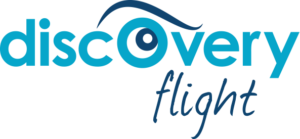- Doylestown Airport.com brought to you by Leading Edge Aviation
- 215 340-0707
- Connect
- 3879 Old Easton Road, Doylestown, PA 18902
Home » Flight Training » Discovery Flight
Treat someone (or yourself) to the discovery of aviation. This flight includes an introduction to flying, a preflight discussion with the instructor, thirty minutes of actual flight time, and a post flight debriefing with the instructor. This flight is great for those who have never been up in a small plane before.
Discovery Flights are conducted in our Cessna 172 aircraft. These are single-engine propeller-driven aircraft in which the instructor and passenger sit side-by-side in the front. These aircraft are meant for flight training and are safe, reliable airplanes for discovery flights.
A Casual but Professional Preflight Briefing
Just like on a passenger jet, the instructor will spend a few minutes with you explaining what will occur, where you’ll fly, and a game plan for how the flight will go. You’ll also get a preflight safety briefing, including how to work the doors and seat belts and where to find the sick sack if you end up needing one.
You Might Participate
It’s voluntary, of course, but you will likely be allowed to fly the aircraft on your own, with the instructor coaching you. After takeoff and when the instructor has maneuvered to a safe altitude above the ground to an area where you can practice, he or she will demonstrate how to do basic turns, climbs, and descents, and will let you control the aircraft. But it’s always dependent on your level of comfort, and the instructor will ask you before giving you control of the airplane. Some people would rather just enjoy the view without ever touching the controls, and that’s completely fine, too.
There Might Be a Few (Small) Bumps
Turbulence is usually not an issue since instructors like to steer clear of choppy weather on Discovery Flights. It’s not enjoyable to get bounced around, even for experienced pilots, but much less so for someone who has never flown in a small airplane before.
For the most part, Discovery Flights are conducted on calm days, but turbulence isn’t entirely predictable, so don’t be alarmed if there are a few small bumps. It may be more or less turbulent than you expect it to be, but your instructor wouldn’t take you up in an unsafe condition, and a small amount of turbulence is quite normal for light aircraft.
You Will Wear a Headset
Pilots wear headsets to reduce the cockpit noise and to clearly communicate with each other, as well as other pilots flying in the area and air traffic control, if necessary. You will be given a headset to wear. They’re comfortable, and they allow you to hear and speak to the pilot and other passengers. Don’t worry: Your voice won’t be heard over the radio by other pilots or ATC – there’s a push-to-talk switch that the pilot uses for that. When you talk into your headset microphone, only the pilot and any other passengers will hear you.
Discovery Flight: $99.00
Additional passengers: $10.0

© 2024 Doylestown Airport Leading Edge Aviation All Rights Reserved.
This is not the Web site of the Bucks County Airport Authority, which owns and operates Doylestown Airport.
For information on the Bucks County Airport Authority and Doylestown Airport, please visit www.bcaanet.org.
Doylestown Airport Leading Edge Aviation
3879 Old Easton Road, Doylestown, PA 18902
Telephone: (215) 340-0707
FAX: (215) 340-9795